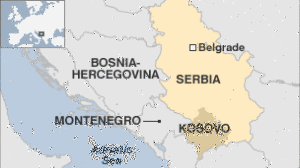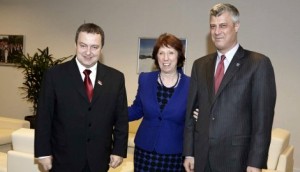 I have argued for years that it is in Serbia’s enlightened national interest to give up all sovereign claim to any part of Kosovo; not least because Serbs had (and still have) neither the political influence nor the military power to enforce such a claim.
I have argued for years that it is in Serbia’s enlightened national interest to give up all sovereign claim to any part of Kosovo; not least because Serbs had (and still have) neither the political influence nor the military power to enforce such a claim.
The international political and military forces aligned against the Serbs are such that they would be well-advised to have their religious leaders lead them in serene prayers of acceptance, instead of having their political leaders lead them in jingoistic cries of defiance, over Kosovo. Because it will take a miracle for them to retain any control over this province when all is said and done.
(“Kosovo: Wither Serbia’s Alamo,” The iPINIONS Journal, April 4, 2007)
No less important, though, is that the EU made “visible and sustainable improvements with Kosovo” a key condition for Serbian membership. Therefore, given that Serbia’s economic survival is so dependent on EU membership, continuing to fight over Kosovo constitutes a classic case of being penny wise and pound foolish:
After all, as much as they cherish historic religious ties with Kosovo, Serbs clearly covet future economic ties with Europe much more.
By contrast, no matter how much their Slav brothers in Russia are prepared to abet their pipe dream for Kosovo (but only with political, not military, support), Serbs appear no more interested in being the political and economic bedfellows of Russians today than they were during the height of the Cold War.
(“Serbs Cry Uncle Over Kosovo,” The iPINIONS Journal, August 3, 2007)
 Well, it took them long enough, but it appears the Serbs are finally coming to their senses. Specifically, after mediating countless rounds of talks between prime ministers Ivica Dacic of Serbia (right) and Hashim Thaçi of Kosovo, the EU’s foreign policy chief, Baroness Cathy Ashton, is now praising them as “brave leaders” for reaching an historic deal to “normalize ties.”
Well, it took them long enough, but it appears the Serbs are finally coming to their senses. Specifically, after mediating countless rounds of talks between prime ministers Ivica Dacic of Serbia (right) and Hashim Thaçi of Kosovo, the EU’s foreign policy chief, Baroness Cathy Ashton, is now praising them as “brave leaders” for reaching an historic deal to “normalize ties.”
‘I wasn’t sure we would get a deal until the moment the two prime ministers initialled it,’ Cathy Ashton said. ‘I really didn’t know.’ Kosovo’s Serbs have long refused to recognise the Kosovan government.
The deal, reached on Friday … concede[s] that the government in Pristina has legal authority over the whole territory, including Serb-majority areas of northern Kosovo.
(BBC, April 24, 2013)
The EU duly marked the occasion on Monday by announcing that accession talks could start within the year if Serbia complies with all provisions that are:
…aimed at ending the ethnic partition of the young country between its Albanian majority and a pocket of some 50,000 Serbs in the north.
(Reuters, April 22, 2013)
Except that, true to its preternaturally fractious character, Serbia is a country divided against itself even where this existential deal is concerned. For here’s how the religious leaders I hoped would lead Serbs in prayers of acceptance six years ago, are instead leading them in prayers of defiance today:
The leader of the Serbian Orthodox Church, Patriarch Irinej, said [this deal] appears to ‘mark the pure surrender … of our most important territory in spiritual and historical terms.’
(BBC, April 24, 2013)
Sadly, this might be all the inspiration ethnic Serbs need to mount an insurgency in Kosovo, aping the one that has been raging, and bedeviling life, in Iraq for the past decade.
It is clear that Kosovo Serbs are not ready to accept the agreements reached between Serbia and Kosovo under pressure from Brussels. Most residents of the province condemn the actions of the government of Ivica Dacic, and consider them an act of betrayal. Many of them are willing to take to the streets to defend their political rights in the breakaway republic.
(Pravada.Ru, April 23, 2013)
Israeli politician and author Abba Eban is renowned for saying, “the Arabs never miss an opportunity to miss an opportunity.” Alas, the same can be said of the Serbs.
Related commentaries:
Kosovo…
Serbs cry uncle…